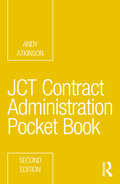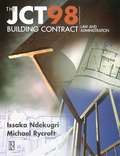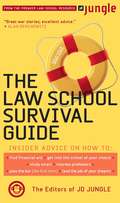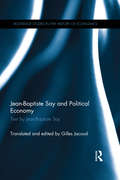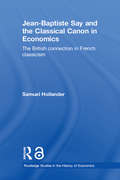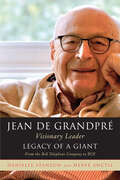- Table View
- List View
JA Company Program: Junior Achievement Student Guide Book
by Junior AchievementThis book helps teens appreciate and better understand the role of business in our society. It shows how businesses function, the structure of the U.S free enterprise system, and the benefits it provides.
JA Company Program: Junior Achievement Economic Study Guide
by Junior AchievementThis book is a study guide about economics to inspire young people to value free enterprise, business, and economics to improve the quality of their lives.
JCPenney: Back in Business
by Christine Snively Elie Ofek K. Shelette StewartIn 2016, JCPenney was in the midst of a multi-year turnaround after coming dangerously close to bankruptcy. Under CEO Marvin Ellison, the company had identified three strategic objectives-a focus on omnichannel, private label goods, and increasing revenue per customer-to guide all company initiatives. The company was running pilot tests on a new line of appliances, rebranded hair salons, and new private label merchandise, and management now needed to decide how best to roll out and market these initiatives across the chain. Ellison also considered how to build upon the company's new ad campaign, Get Your Penney's Worth, and how to strike the right balance between serving its "core" and "emerging" customer segments. He wondered if these objectives and initiatives were enough to restore JCPenney's position in the evolving retail landscape.
JCT Contract Administration Pocket Book (Routledge Pocket Books)
by Andy AtkinsonThis book is quite simply about contract administration using the JCT contracts. The key features of the new and updated edition continue to be its brevity, readability and relevance to everyday practice. It provides a succinct guide written from the point of view of a construction practitioner, rather than a lawyer, to the traditional form of contract with bills of quantities SBC/Q2016, the design and build form DB2016 and the minor works form MWD2016. The book broadly follows the sequence of producing a building from the initial decision to build through to completion. Chapters cover: Procurement and tendering Payments, scheduling, progress and claims Contract termination and insolvency Indemnity and insurance Supply chain problems, defects and subcontracting issues Quality, dealing with disputes and adjudication How to administer contracts for BIM-compliant projects JCT contracts are administered by a variety of professionals including project managers, architects, engineers, quantity surveyors and construction managers. It is individuals in these groups, whether experienced practitioner or student, who will benefit most from this clear, concise and highly relevant book.
JCT98 Building Contract: Law and Administration
by Issaka Ndekugri Michael RycroftThe Joint Contracts Tribunal's Standard Form of Building Contract is the most common contract used in the UK to procure building work. Understanding it is a core part of any construction student's degree and a vital part of the working life of professionals in the construction industry. 'The JCT98 Building Contract' works through the contract systematically explaining it in easy-to-follow language, covering all contract issues thoroughly and illustrating with case law examples the current situation and latest amendments. It is ideal reading for both the student of construction and the professional seeking to update their knowledge.
JD: Envisioning the Future of Retail (A)
by Feng Zhu Shirley SunJD, China's second largest e-commerce company by gross merchandise volume (GMV) after Alibaba, had expanded rapidly from 2012 to 2016. When the company celebrated its 13th birthday in 2017, Richard Liu, its founder, deliberated on the company's growth strategies. The landscape of China's e-commerce market had changed drastically in recent years. The growth in the e-commerce market had declined significantly. Furthermore, the advancement of AI and big data was turning shopping into a boundaryless experience-consumers could purchase products tailored to their preferences anywhere and anytime. Finally, JD's rival, Alibaba, had made rapid moves to improve its logistics capabilities and expanded aggressively in the offline market. Liu must decide how JD should compete and how to expand the company's offline strategy.
The Jd Jungle Law School Survival Guide
by Editors Jd JungleThere's an old saying about law school: The first year, they scare you to death; the second year, they work you to death; the third year, they bore you to death. Helping to alleviate this famed fright, sweat, and boredom, The JD Jungle Law School Survival Guide expertly shows current and prospective students how to navigate all three years of law-school torture. Comprehensive, practical, and witty, it includes advice from students in the trenches, successful graduates, sage professors, and working professionals, including:How to identify and get accepted at the law school of your choicePlaces to look for and get financial aidEffective note-taking, study, and exam-day strategiesTips for managing law-school stressHow to pass the bar exam the first timeHow to land a law internship-and then the job of your dreamsFounded by parent company Jungle Interactive Media in 2000, JD Jungle is one of the hottest new magazines on the market. With a circulation of 80,000 subscribers, it can be found on newsstands everywhere. Visit www.JdJungle.com.
The JDC at 100: A Century of Humanitarianism
by Avinoam Patt Atina Grossmann Linda G. Levi Maud S. Mandel Mikhail Mitsel Elissa Bemporad Jaclyn Granick Suzanne D. Rutland Veerle Vanden Daelen Laura Hobson Faure Anna Sommer Schneider Kierra Crago-Schneider Inga Veksler Marion Kaplan Kaplan Rakefet Zalashik Zhava Litvac GlaserThe JDC at 100: A Century of Humanitarianismtraces the history of the JDC—an organization founded to aid victims of World War I that has played a significant role in preserving and sustaining Jewish life across the globe. The thirteen essays in this volume, edited by Avinoam Patt, Atina Grossmann, Linda G. Levi, and Maud S. Mandel, reflect critically on the organization’s transformative impact on Jewish communities throughout the world, covering topics such as aid for refugees from National Socialism in Cuba, Shanghai, Tehran, the Dominican Republic, France, Belgium, and Australia; assistance to Holocaust survivors in Displaced Persons camps for rebuilding and emigration; and assistance in Rome and Vienna to Soviet Jewish transmigrants in the 1970s. Despite the sustained transnational humanitarian work of this pioneering non-governmental organization, scholars have published surprisingly little devoted to the history and remarkable accomplishments of the JDC, nor have they comprehensively explored the JDC’s role on the ground in many regions and cultures. This volume seeks to address those gaps not only by assessing the widespread impact of the JDC but also by showcasing the richness and depth of the JDC Archives as a resource for examining modern Jewish history in global context. The JDC at 100 is addressed to scholars and students of humanitarian aid, conflict, displacement, and immigration, primarily in Jewish, European, and American history. It will also appeal to readers with a more general interest in Jewish studies and refugee studies, Holocaust museum professionals, and those engaged in Jewish and other relief and resettlement programs.
Jean-Baptiste Say: Revolutionary, Entrepreneur, Economist (Routledge Studies in the History of Economics)
by Evert SchoorlThis volume is the first full-length biography of Jean-Baptiste Say (1767-1832), the most famous French classical economist. During his lifetime Say actively took part in three revolutions: the French Revolution, the Industrial Revolution and the establishment of economics as an academic discipline. He struggled with Bonaparte, was the owner of a cotton spinning mill, and published his famous Treatise of political economy and many other economic writings.
Jean-Baptiste Say and Political Economy: Or The Production, Distribution, And Consumption Of Wealth. By Jean Baptiste Say. Tr. From The 4th Ed. Of The French (Routledge Studies in the History of Economics)
by Jean-Baptiste SayJean-Baptiste Say (1767–1832) was one of the first great economists to have laid down the foundations of economic science. Author of the famous Treatise on Political Economy in 1803, which was revised and re-edited on several occasions, he published numerous other works including a voluminous Complete Course in Practical Political Economy in 1828–9. He also taught political economy successively from 1815 until his death in three Parisian establishments: the Athénée, the Conservatory of Arts and Trades, and the Collège de France. <P><P> The texts in which Say exposes his approach to political economy have not been available in the English language until now except for the fourth edition of the ‘Preliminary Discourse’ which serves as an introduction to the Treatise. This book presents a translation which renders his works accessible to the English speaking world. For the first time, English readers will be able to become directly immersed in Say’s principal texts, where he develops his conception of political economy. Jean-Baptiste Say and Political Economy proposes a translation of a selection of eleven of Say’s texts. The first three are versions of the ‘Preliminary Discourse’ from the Treatise’s editions of 1803, 1814 and 1826 with the variations of the editions of 1817, 1819 and 1841. The following four texts are the opening discourses pronounced at the Conservatory in 1820 and 1828 and the Collège de France in 1831 and 1832. The eighth text is the ‘General Considerations’ which open the Complete Course in Practical Political Economy of 1828, with the variations of the 1840 re-edition. The final three texts are those Say devotes to ‘the progress of political economy’ in what is akin to a history of economic thought. <P><P> This volume is of great importance to economic historians and people studying Jean-Baptiste Say, as well as those who are interested in economic theory and philosophy and political economy.
Jean-Baptiste Say and the Classical Canon in Economics: The British Connection in French Classicism (Routledge Studies in the History of Economics #Vol. 72)
by Samuel HollanderThis book explores the perceived paradigmatic conflict within British classical economics between the so called 'Ricardo School' and the contemporary French Economics of Jean-Baptiste Say. Samuel Hollander provides the reader with extensive evidence, utilizing all editions of Say's main texts and his lesser-known writings in order to demonstrate his adherence to much of Ricardian theory. This intriguing book focuses on selected doctorinal issues and surrounding debates, and will interest all serious historians of economic thought, finding a place on the bookshelves of many economists across the world.
Jean-Claude Biver (A): The Reemergence of the Swiss Watch Industry
by Ryan RaffaelliIn the early 1980s, the Swiss watch industry was near collapse after failing to adapt to Japanese competition from battery-powered quartz technology. In 1982, Jean-Claude Biver purchased Blancpain, a watch company that had been out of business since 1961 but had once made mechanical watches, for $16,000. After successfully reviving Blancpain, Biver sold the company to Nicolas G. Hayek (Chairman of the Swatch Group) for $43 million a decade later. Hayek agreed to have Biver stay on and gave him responsibility to revive the once venerable, but ailing, watch company Omega. Between 1995 and 1999, Biver led another turnaround effort that increased Omega's revenues from $350 million to $900 million. While it was presumed across the industry that Biver would be the next CEO of Swatch Group, in early 2000 Biver began to sense that he may not receive the top position when Hayek retired. At the end of the case, Biver must decide whether he should leave the Swatch Group and retire himself, or possibly start over yet again and take the reins of a small but struggling watch company, Hublot. The case examines the actions that Biver took to transform Blancpain and Omega, and how his broad vision ultimately transformed the entire Swiss watch industry. It presents Biver as a complex leader who at times could be very harsh on his employees, but whose passion and vision engendered fierce loyalty from those who worked with him.
Jean-Claude Biver (A): The Reemergence of the Swiss Watch Industry
by Ryan L. RaffaelliIn the early 1980s, the Swiss watch industry was near collapse after failing to adapt to Japanese competition from battery-powered quartz technology. In 1982, Jean-Claude Biver purchased Blancpain, a watch company that had been out of business since 1961 but had once made mechanical watches, for $16,000. After successfully reviving Blancpain, Biver sold the company to Nicolas G. Hayek (Chairman of the Swatch Group) for $43 million a decade later. Hayek agreed to have Biver stay on and gave him responsibility to revive the once venerable, but ailing, watch company Omega. Between 1995 and 1999, Biver led another turnaround effort that increased Omega's revenues from $350 million to $900 million. While it was presumed across the industry that Biver would be the next CEO of Swatch Group, in early 2000 Biver began to sense that he may not receive the top position when Hayek retired. At the end of the case, Biver must decide whether he should leave the Swatch Group and retire himself, or possibly start over yet again and take the reins of a small but struggling watch company, Hublot. The case examines the actions that Biver took to transform Blancpain and Omega, and how his broad vision ultimately transformed the entire Swiss watch industry. It presents Biver as a complex leader who at times could be very harsh on his employees, but whose passion and vision engendered fierce loyalty from those who worked with him.
Jean-Claude Biver (A): The Reemergence of the Swiss Watch Industry
by Ryan L. RaffaelliIn the early 1980s, the Swiss watch industry was near collapse after failing to adapt to Japanese competition from battery-powered quartz technology. In 1982, Jean-Claude Biver purchased Blancpain, a watch company that had been out of business since 1961 but had once made mechanical watches, for $16,000. After successfully reviving Blancpain, Biver sold the company to Nicolas G. Hayek (Chairman of the Swatch Group) for $43 million a decade later. Hayek agreed to have Biver stay on and gave him responsibility to revive the once venerable, but ailing, watch company Omega. Between 1995 and 1999, Biver led another turnaround effort that increased Omega's revenues from $350 million to $900 million. While it was presumed across the industry that Biver would be the next CEO of Swatch Group, in early 2000 Biver began to sense that he may not receive the top position when Hayek retired. At the end of the case, Biver must decide whether he should leave the Swatch Group and retire himself, or possibly start over yet again and take the reins of a small but struggling watch company, Hublot. The case examines the actions that Biver took to transform Blancpain and Omega, and how his broad vision ultimately transformed the entire Swiss watch industry. It presents Biver as a complex leader who at times could be very harsh on his employees, but whose passion and vision engendered fierce loyalty from those who worked with him.
Jean de Grandpré: Legacy of a Giant
by Danielle Stanton Hervé AnctilVisionary leader and businessman Jean de Grandpré has earned many nicknames: he is known variously as the Simplifier, the Architect, and the Strategist. A lawyer when he joined Bell Canada in 1966, he went on to build a telecommunications empire that spanned the continent, crossing paths with politicians, moguls, and philanthropists along the way.Beginning as Bell’s general counsel, de Grandpré quickly rose through the corporate ranks and became president in 1973. A few years later he created Bell Canada Enterprises, one of America’s largest telecommunications companies. A globally recognized manager and director, he has served on the boards of numerous companies, both in Canada and abroad. As generous as he is discreet, he is involved with several charities, including the Papillon Foundation, which helps disabled children. At McGill University, his alma mater, De Grandpré served as chancellor from 1984 to 1991 and is now governor emeritus and chancellor emeritus.Danielle Stanton and Hervé Anctil retrace the admirable career of this influential man whose life has spanned a century. Offering insight into the secrets of his success, Jean de Grandpré will inspire new generations of entrepreneurs.
Jeanette Clough at Mount Auburn Hospital
by Laura Morgan Roberts Ayesha KanjiJeanette Clough, the CEO of Mt. Auburn Hospital, successfully leads a turnaround for the struggling local hospital. When she assumed leadership of Mt. Auburn in 1998, the hospital had recently suffered a $10 million loss. During her first six months, several members of the senior leadership team quit. Clough successfully led this change effort through a transparent, collaborative approach that focused first and foremost on patient care. She was skilled at building trust and credibility with key constituents: the trustees, medical staff, and employees. After the first year, they reduced the losses to $5 million. In 2000, the hospital broke even. In 2004, the hospital earned a $7 million profit. The hospital is currently in the midst of a capital campaign to update the facilities and expand. Community groups are resisting the hospital expansion in Cambridge, posing a new set of challenges. Clough must also be clear about the strategic positioning of the hospital--a mixture of a community and teaching hospital. How can Mt. Auburn maintain this unique positioning without attempting to expand beyond its reach in competing with the other Boston-based teaching hospitals?
Jeanne Lewis at Staples, Inc. (A)
by Linda A. Hill Kristin C. DoughtyJeanne Lewis, after six years with Staples, Inc., is promoted to senior vice president of marketing. She is to work for fifteen months alongside her predecessor, a legacy in the organization, "learning the ropes" before he moves on. This case is set nine months after she begins working with the marketing department. Staples has just emerged from a period of prolonged litigation around an FTC antitrust suit challenging Staples' attempted merger with Office Depot. Post-merger, Lewis must determine how the marketing department can most effectively and efficiently help the company maintain its competitive edge in an increasingly competitive and complex market. Looks at the challenges a middle manager faces "taking charge" and managing change in a revitalization situation in which a more evolutionary approach is appropriate.
Jeanne Lewis at Staples, Inc. (A) (Abridged)
by Jennifer M. Suesse Linda A. HillJeanne Lewis, after six years with Staples, Inc., is promoted to senior vice president of marketing. She is to work for fifteen months alongside her predecessor, a legacy in the organization, "learning the ropes" before he moves on. This case is set nine months after she begins working with the marketing department. At this time, Staples has just emerged from a period of prolonged litigation because of an FTC antitrust suit challenging Staples' attempted merger with Office Depot. Post-merger, Lewis must determine how the marketing department can most effectively and efficiently help the company maintain its competitive edge in an increasingly competitive and complex market. Looks at the challenges a middle manager faces "taking charge" and managing change in a revitalization situation in which a more evolutionary approach is appropriate.
JA Economics: Student Study Guide (3rd Edition)
by Junior AchievementThe contents of this third edition of Junior Achievement Economics Study Guide are What Is Economics? Free Enterprise in the United States, Demand, Supply, Market-Clearing Price, Consumers, Savers, and Investors, The Business of Free Enterprise, Financing a Business, Production and Productivity, The U.S. Labor Force, Competition Among Businesses, Government and the United States Economy, Money and Financial Institutions, Economic Stability, International Trade, and Our Globalized World.

